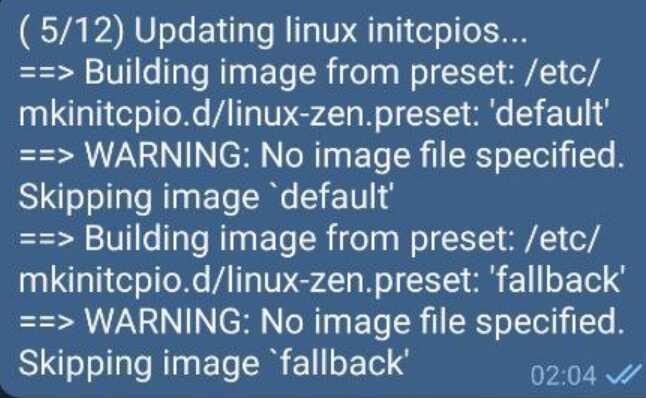Hi there,
I am relatively new to the Garuda Linux but have been running it exclusively for the past 9 months and have never had any major issues updating so far. However, for about a month or even longer I was unable to perform a complete system update because it caused the boot screen stops when displaying
loading initial ramdisk
I can see the HDD indicator light still blinking away but I can't get the login manager to appear or get a tty by pressing ALT-F5 or any other key combination. The keyboard still works and I am able to restart using CTRL-ALT-ESC.
Currently, I am stuck at restoring the timeshift backup and working with an un-updated kernel. I have read that it could be related to the proprietary nvidia drivers or the sddm window manager not playing nicely. I was yet unable to pinpoint the issue.
Booting without quiet splash did not yield any further insights.
I am hoping that someone might have come across the same issue or has an idea about how to tackle the problem. Overall, I am very happy with Garuda and thought I could finally settle, stop distro-hopping and avoid a complete reinstall.
Many thanks in advance!
inxi -Faz
System: Kernel: 5.13.13-zen1-1-zen x86_64 bits: 64 compiler: gcc v: 11.1.0
parameters: BOOT_IMAGE=/@/boot/vmlinuz-linux-zen root=UUID=6a2b97c6-542c-492c-8b9d-09421cfef9ef rw
rootflags=subvol=@ quiet splash rd.udev.log_priority=3 vt.global_cursor_default=0
systemd.unified_cgroup_hierarchy=1 resume=UUID=a09c71c1-9fbe-409a-ad56-c0d570705576 loglevel=3
Desktop: KDE Plasma 5.22.5 tk: Qt 5.15.2 info: latte-dock wm: kwin_x11 vt: 1 dm: SDDM Distro: Garuda Linux
base: Arch Linux
Machine: Type: Desktop Mobo: Gigabyte model: Z590 GAMING X v: x.x serial: <filter> UEFI: American Megatrends LLC. v: F2
date: 01/06/2021
CPU: Info: 8-Core model: Intel Core i7-10700 bits: 64 type: MT MCP arch: Comet Lake family: 6 model-id: A5 (165)
stepping: 5 microcode: EC cache: L2: 16 MiB
flags: avx avx2 lm nx pae sse sse2 sse3 sse4_1 sse4_2 ssse3 vmx bogomips: 92796
Speed: 4703 MHz min/max: 800/4800 MHz Core speeds (MHz): 1: 4703 2: 4702 3: 4704 4: 2498 5: 4662 6: 4649 7: 3720
8: 4700 9: 4695 10: 4707 11: 4702 12: 4689 13: 4602 14: 4681 15: 4373 16: 4711
Vulnerabilities: Type: itlb_multihit status: KVM: VMX disabled
Type: l1tf status: Not affected
Type: mds status: Not affected
Type: meltdown status: Not affected
Type: spec_store_bypass mitigation: Speculative Store Bypass disabled via prctl and seccomp
Type: spectre_v1 mitigation: usercopy/swapgs barriers and __user pointer sanitization
Type: spectre_v2 mitigation: Enhanced IBRS, IBPB: conditional, RSB filling
Type: srbds status: Not affected
Type: tsx_async_abort status: Not affected
Graphics: Device-1: NVIDIA GK208B [GeForce GT 710] vendor: Gigabyte driver: nvidia v: 470.63.01 alternate: nouveau,nvidia_drm
bus-ID: 01:00.0 chip-ID: 10de:128b class-ID: 0300
Display: x11 server: X.Org 1.20.13 compositor: kwin_x11 driver: loaded: nvidia display-ID: :0 screens: 1
Screen-1: 0 s-res: 3840x1080 s-dpi: 95 s-size: 1027x292mm (40.4x11.5") s-diag: 1068mm (42")
Monitor-1: VGA-0 res: 1920x1080 hz: 60 dpi: 102 size: 477x268mm (18.8x10.6") diag: 547mm (21.5")
Monitor-2: HDMI-0 res: 1920x1080 hz: 60 dpi: 96 size: 510x290mm (20.1x11.4") diag: 587mm (23.1")
OpenGL: renderer: NVIDIA GeForce GT 710/PCIe/SSE2 v: 4.6.0 NVIDIA 470.63.01 direct render: Yes
Audio: Device-1: Intel vendor: Gigabyte driver: snd_hda_intel v: kernel bus-ID: 00:1f.3 chip-ID: 8086:f0c8 class-ID: 0403
Device-2: NVIDIA GK208 HDMI/DP Audio vendor: Gigabyte driver: snd_hda_intel v: kernel bus-ID: 01:00.1
chip-ID: 10de:0e0f class-ID: 0403
Sound Server-1: ALSA v: k5.13.13-zen1-1-zen running: yes
Sound Server-2: JACK v: 1.9.19 running: no
Sound Server-3: PulseAudio v: 15.0 running: no
Sound Server-4: PipeWire v: 0.3.34 running: yes
Network: Device-1: Realtek RTL8125 2.5GbE vendor: Gigabyte driver: r8169 v: kernel port: 3000 bus-ID: 03:00.0
chip-ID: 10ec:8125 class-ID: 0200
IF: enp3s0 state: up speed: 1000 Mbps duplex: full mac: <filter>
Drives: Local Storage: total: 2.61 TiB used: 1.14 TiB (43.6%)
SMART Message: Unable to run smartctl. Root privileges required.
ID-1: /dev/nvme0n1 maj-min: 259:0 vendor: Samsung model: SSD 970 EVO Plus 500GB size: 465.76 GiB block-size:
physical: 512 B logical: 512 B speed: 31.6 Gb/s lanes: 4 type: SSD serial: <filter> rev: 2B2QEXM7 temp: 40.9 C
scheme: GPT
ID-2: /dev/sda maj-min: 8:0 vendor: Western Digital model: WD20EFRX-68EUZN0 size: 1.82 TiB block-size:
physical: 4096 B logical: 512 B speed: 6.0 Gb/s type: HDD rpm: 5400 serial: <filter> rev: 0A80 scheme: GPT
ID-3: /dev/sdb maj-min: 8:16 vendor: SanDisk model: SSD PLUS 240GB size: 223.57 GiB block-size: physical: 512 B
logical: 512 B speed: 6.0 Gb/s type: SSD serial: <filter> rev: 04RL scheme: GPT
ID-4: /dev/sdc maj-min: 8:32 vendor: Crucial model: M4-CT128M4SSD2 size: 119.24 GiB block-size: physical: 512 B
logical: 512 B speed: 6.0 Gb/s type: SSD serial: <filter> rev: 000F scheme: GPT
Partition: ID-1: / raw-size: 188.96 GiB size: 188.96 GiB (100.00%) used: 121.71 GiB (64.4%) fs: btrfs dev: /dev/sdb2
maj-min: 8:18
ID-2: /boot/efi raw-size: 260 MiB size: 256 MiB (98.45%) used: 563 KiB (0.2%) fs: vfat dev: /dev/sdb1 maj-min: 8:17
ID-3: /home raw-size: 188.96 GiB size: 188.96 GiB (100.00%) used: 121.71 GiB (64.4%) fs: btrfs dev: /dev/sdb2
maj-min: 8:18
ID-4: /var/log raw-size: 188.96 GiB size: 188.96 GiB (100.00%) used: 121.71 GiB (64.4%) fs: btrfs dev: /dev/sdb2
maj-min: 8:18
ID-5: /var/tmp raw-size: 188.96 GiB size: 188.96 GiB (100.00%) used: 121.71 GiB (64.4%) fs: btrfs dev: /dev/sdb2
maj-min: 8:18
Swap: Kernel: swappiness: 133 (default 60) cache-pressure: 100 (default)
ID-1: swap-1 type: partition size: 34.35 GiB used: 0 KiB (0.0%) priority: -2 dev: /dev/sdb3 maj-min: 8:19
ID-2: swap-2 type: zram size: 31.22 GiB used: 0 KiB (0.0%) priority: 100 dev: /dev/zram0
Sensors: System Temperatures: cpu: 48.0 C mobo: 16.8 C gpu: nvidia temp: 49 C
Fan Speeds (RPM): N/A gpu: nvidia fan: 36%
Info: Processes: 400 Uptime: 3m wakeups: 0 Memory: 31.22 GiB used: 3.61 GiB (11.6%) Init: systemd v: 249 tool: systemctl
Compilers: gcc: 11.1.0 Packages: pacman: 1513 lib: 361 flatpak: 0 Shell: fish v: 3.3.1 default: Bash v: 5.1.8
running-in: alacritty inxi: 3.3.06

